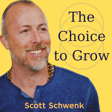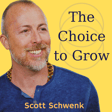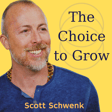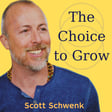
One Breath Can Change Your Life with Suze Yalof Schwartz
In this episode of The Choice to Grow, Suze Yalof Schwartz, founder of Unplug Meditation, shares the powerful story of how one mindful breath changed her entire life—and how it can change yours. From her high-fashion past at Vogue to becoming a leading voice in meditation, Suze invites us into the radical simplicity of the pause. She and Scott explore the science of stillness, the myth of “not enough time,” and how to shift from reactivity to presence, one breath at a time.
Suze Yalof Schwartz - Meditation Maven, Wellness Pioneer, Transformer
Suze Yalof Schwartz is the Founder and CEO of the Unplug Meditation App, and the world's first drop-in secular meditation studio, Unplug in Los Angeles. She is also the author of Unplug: A Simple Guide To Meditation for Busy Skeptics and Modern Soul Seekers. In 2012, Suze learned a three-minute meditation that changed her life forever. Prior to this, she was a fashion editor and "makeover guru" working at Vogue, Elle, Marie Claire and Glamour Magazine with regular appearances on GMA, The Today Show, CBS Early Show, and more. Once she discovered meditation, she was determined to keep doing it but could not find a place to easily learn and practice. After taking hundreds of hours of classes, reading every book possible, and listening to podcasts and lectures from the world's most famous meditation teachers, Suze realized that meditation needed a makeover and she was the one to do it. Suze's mission is to make meditation simple, accessible, powerful and interesting enough so that everyone will want to practice it and experience the benefits for themselves.
Scott Schwenk - Master coach, spiritual teacher, culture architect
Scott Schwenk’s teachings, courses and private mentoring guide leaders, seekers and creatives to explore their deepest selves in service of thriving on all levels of being, both individually and relationally.
Host and creator of the podcast The Choice To Grow, Scott is known for his hugely popular courses and workshops with OneCommune.com, Younity.com, Wanderlust Festivals, and Unplug Meditation, Scott has been catalyzing the inner evolution of others for decades: helping them to grow, transform obstacles into opportunities, and find Love within.
Scott spent several years living and studying in a meditation monastery which introduced him to the core body of Tantric meditation traditions which continue to flow through each of his teachings. Scott continues to study and teach from two key Tantric lineage streams.
Apprenticeships in leadership development, meditation and philosophy training, shadow work/shadow resolution and spiritual awakening are all part of Scott’s development into the thought-leader that he is today. He continues to refine his offerings studying and practicing with key innovators at the leading edges of human development.



